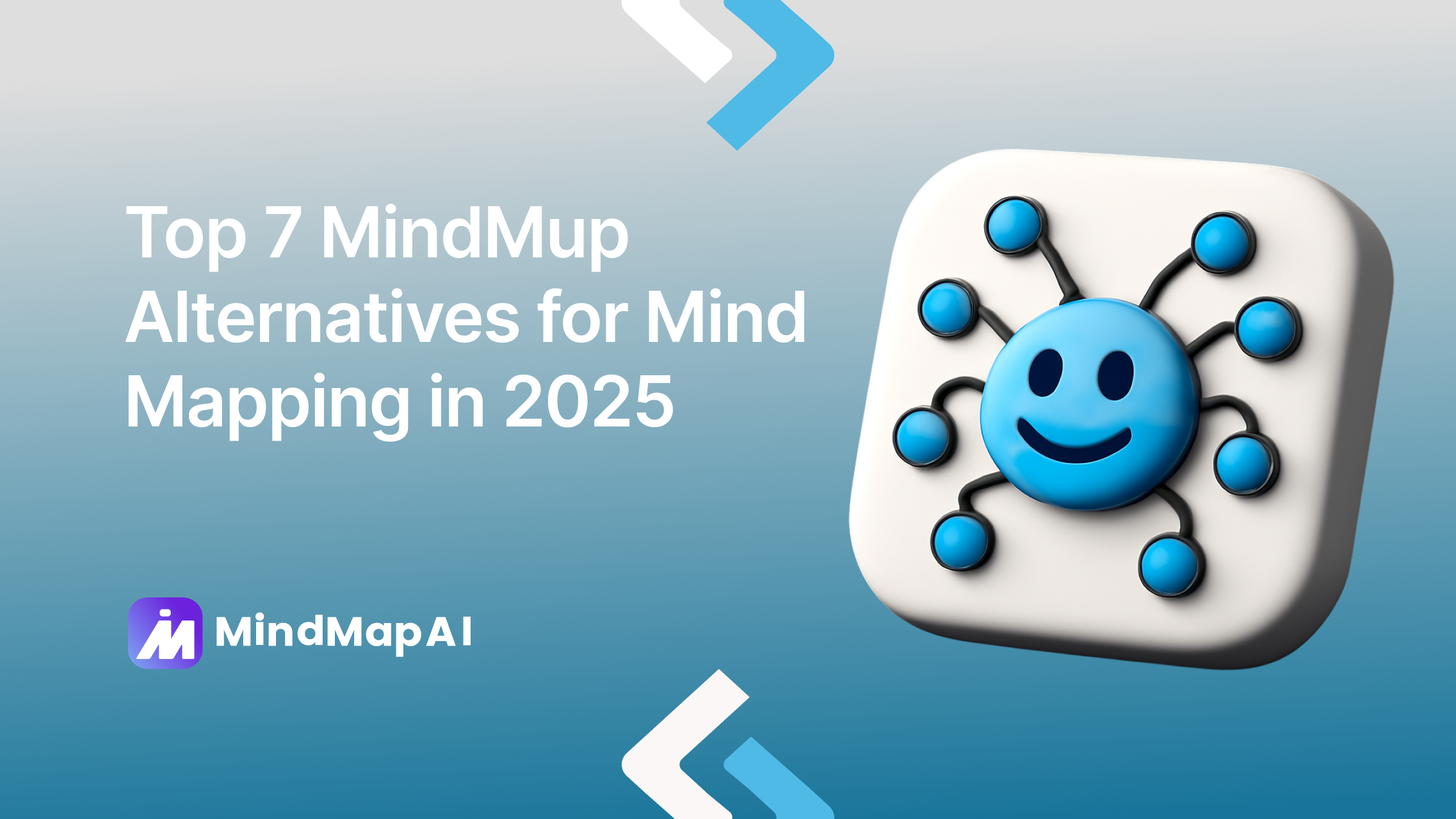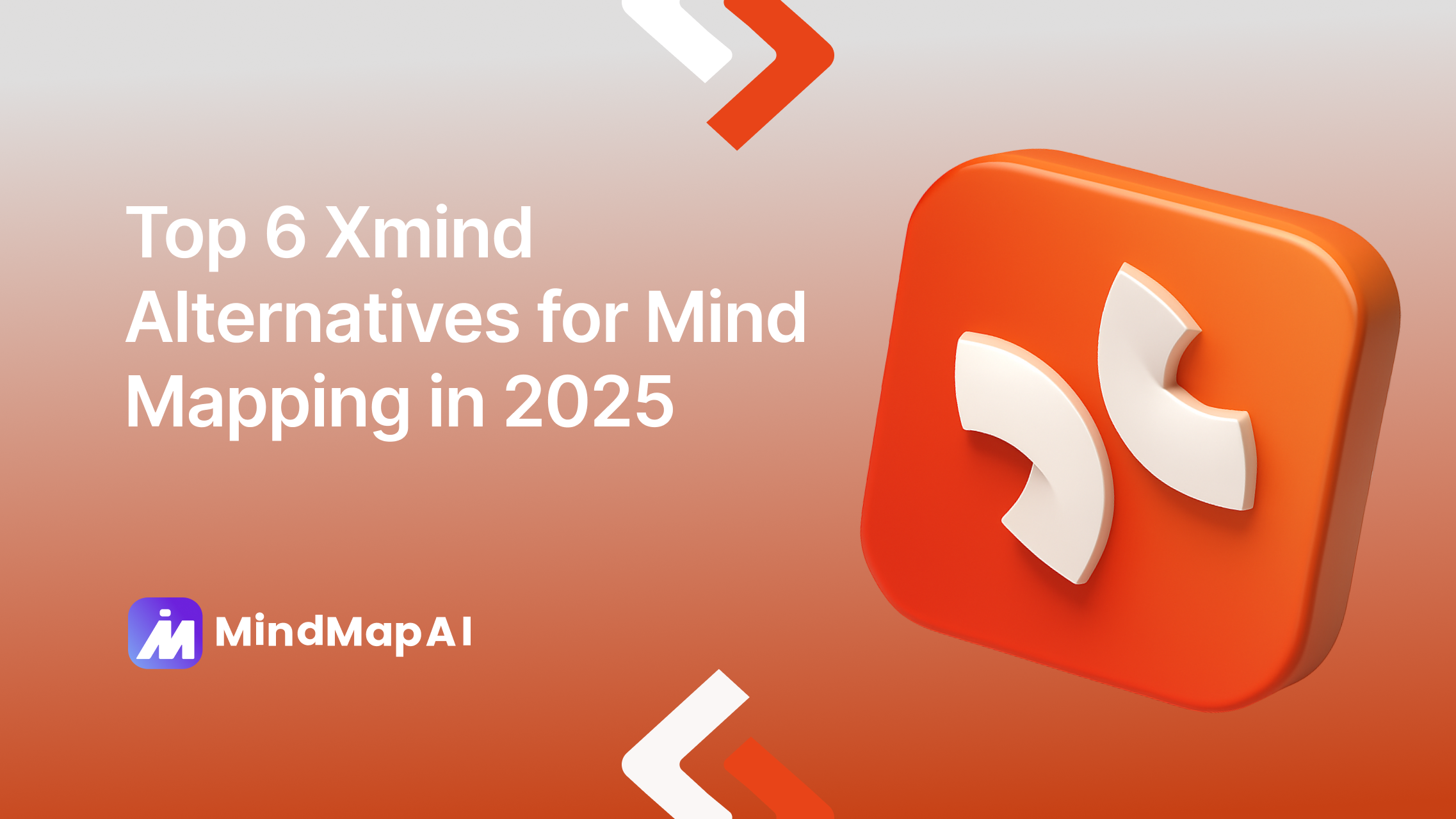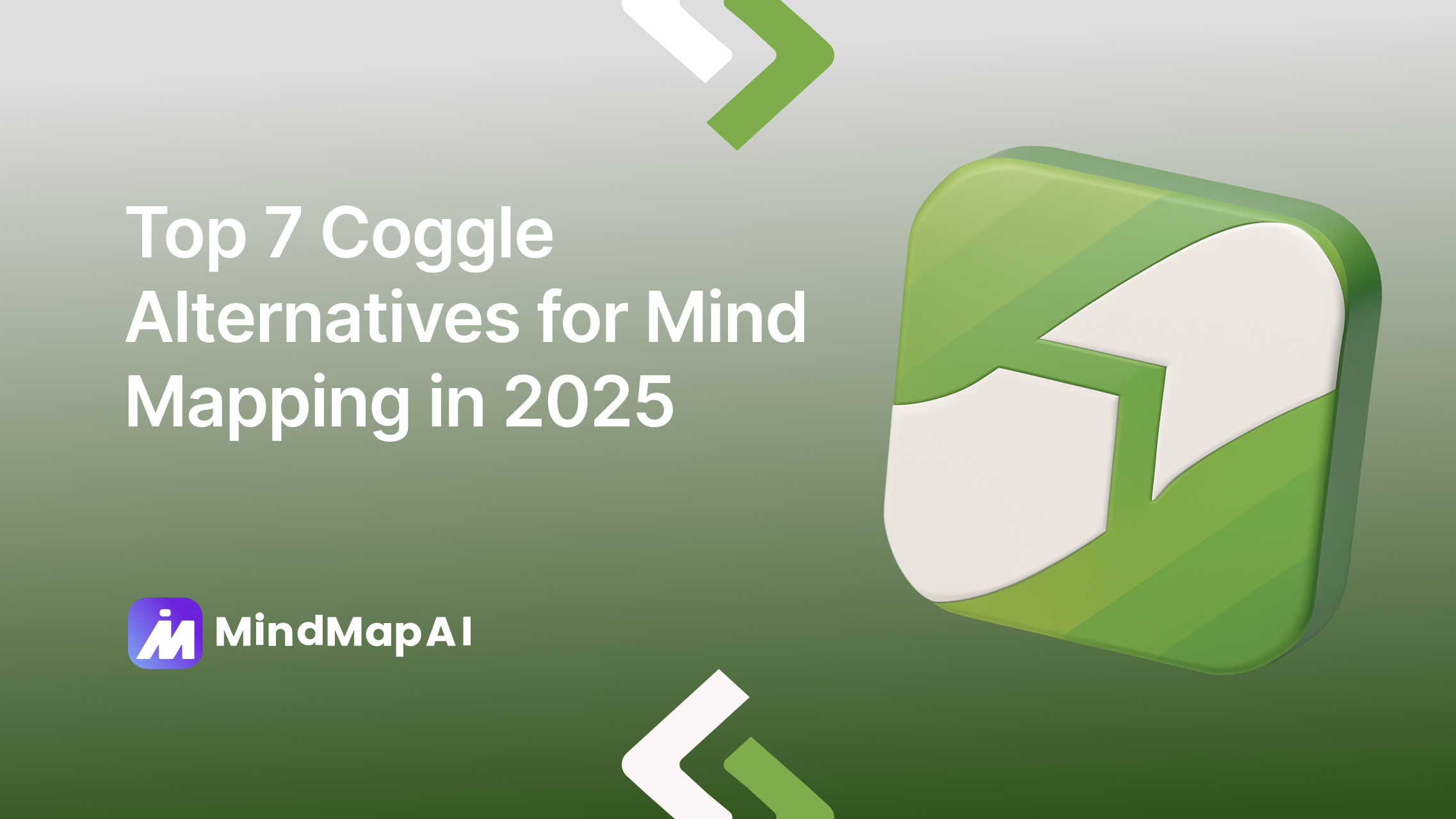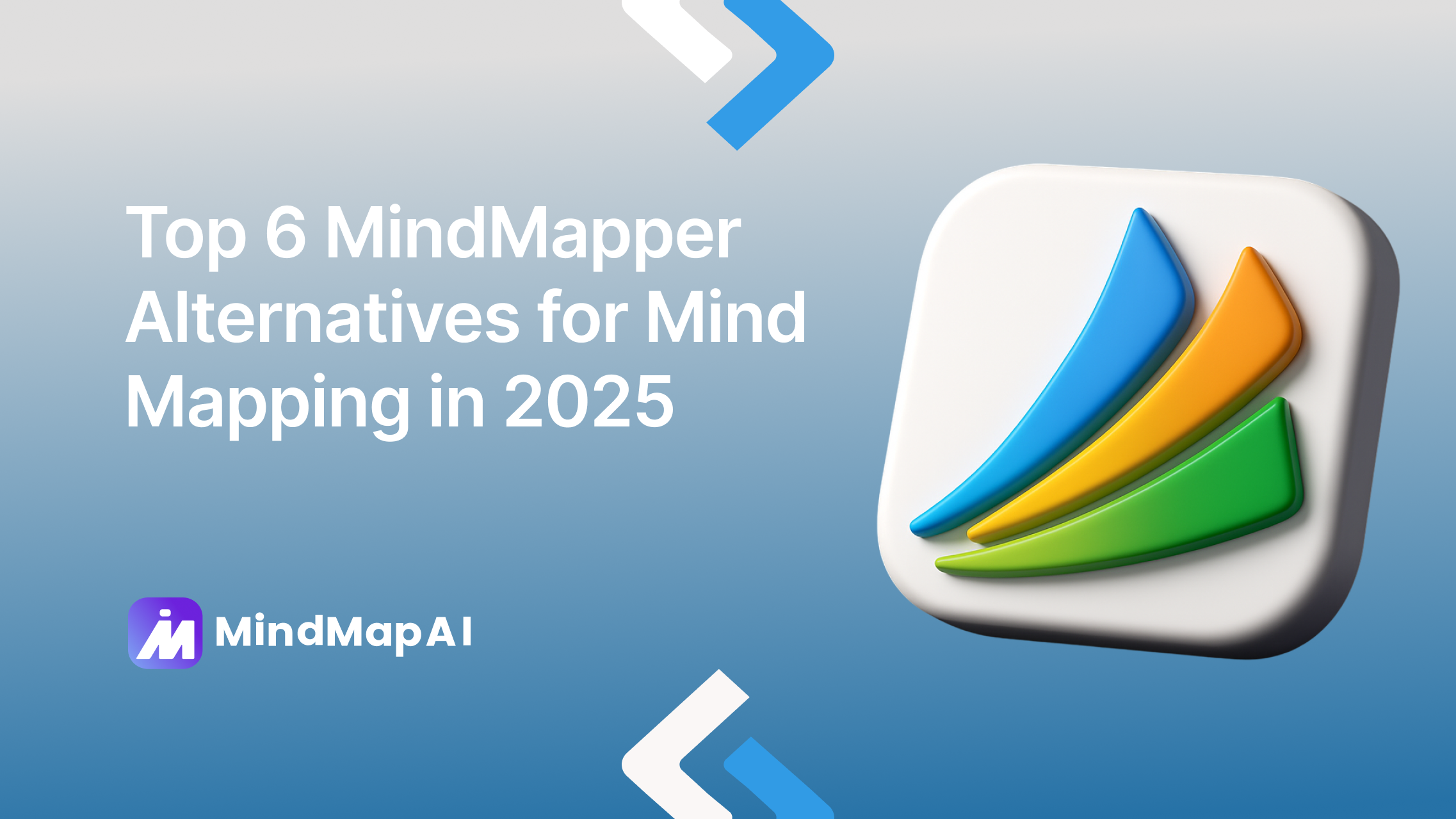
Top 7 MindMup Alternatives for Mind Mapping in 2025
MindMup is a popular, browser-based mind mapping tool that prioritizes simplicity and ease of use, making it ideal for brainstorming, note-taking, project planning, and team collaboration. With features like unlimited map creation, real-time collaboration, seamless Google Drive integration, and the ability to convert maps to PDFs, PowerPoint slides, or outlines, it’s a versatile choice for both individuals and teams.
However, while MindMup offers great flexibility, it may lack some of the advanced features that other tools bring to the table. Users looking for more automation, AI-driven content summarization, or instant idea expansion and mapping may feel limited by MindMup’s core functionality.
This guide covers the best MindMup alternatives in 2025, mind mapping platforms that offer faster content-to-map generation, deeper AI integration, and more flexibility to fit diverse workflows and project needs.
Turn your ideas into an AI mind map in seconds
1. MindMap AI

Why it stands out
MindMap AI redefines mind mapping by integrating AI-powered features to enhance brainstorming, idea expansion, and research. Unlike MindMup, which relies entirely on manual input and basic mapping features, MindMap AI allows you to upload entire documents, PDFs, CSVs, audio, video files, and images, and within seconds, it generates a structured, editable mind map. This AI-driven automation accelerates the process, making it ideal for researchers, students, professionals, and anyone needing to organize large volumes of data efficiently.
The Copilot Chat feature is a key differentiator, allowing you to interact directly with the AI for real-time edits, including expanding nodes, summarizing information, or focusing on specific topics. Second-Order Connections automatically surface relationships between nodes, helping you spot gaps and patterns that might have been overlooked, ideal for tasks like research, audits, and strategic planning. In essence, MindMap AI transforms the traditional mind mapping process into a faster, more intelligent workflow, combining manual and AI-driven editing for a seamless user experience.
Key Features
Multi-format ingest: Instantly generate mind maps from text, PDFs, images, videos, audio files, CSVs, and more.

Copilot Chat: Use natural language commands to interact with your mind map, expanding or refining branches with ease.

Second-Order Connections: AI identifies and links related concepts across your map, revealing connections that might otherwise be missed.

Effortless sharing and exports: Share via private or public links or export maps as PNG, SVG, PDF, Markdown, CSV, or HTML.

Version history(Undo & Redo): Keep track of all changes and revisions in the free version, unlike MindMup’s limited version history.

Pros
AI-powered automation: Helps with mind map generation, idea expansion, and summarization.
Broad format support: Upload text, PDFs, images, CSVs, audio, video, and more to create maps from various sources.
Cross-device access: Available on web, iOS, and Android platforms ideal for users who need to work across devices.
Full-featured free version: With unlimited manual maps and watermark-free exports.
Lifetime purchase option: Offering more flexibility compared to MindMup’s subscription model.
Cons
No real-time co-editing: Collaboration is limited to shared links, without live multi-user editing.
Pricing
Free plan: 50 credits per month.
Basic: $7.49/month (or $3.74/month when billed annually) for 2,000 credits.
Pro: $14.99/month (or $7.49/month when billed annually) for 5,000 credits.
Lifetime tiers: Available starting at $129 (one-time payment).
Credit add-ons: 2,000 credits for $4.99.
Discover how MindMap AI stacks up against MindMup in features, pricing, and usability
2. MindMapper

Why it stands out
MindMapper combines traditional mind mapping with advanced planning and diagramming tools, making it ideal for users seeking structured workflows. It’s particularly well-suited for corporate environments and team-based projects, offering both cloud support and offline functionality. The one-time purchase model (no subscriptions) adds value for long-term use, making it a popular choice for businesses and individuals alike.
Key Features
Mind mapping, diagramming, and project management integrated into one tool.
Full cloud support with seamless sync across devices.
Offline support with desktop versions for work without internet access.
Pros
One-time purchase with a perpetual license; no subscription fees.
Flexible for both personal use and team-based collaboration.
Available for both Windows and macOS, making it versatile across devices.
Cons
No advanced features for automatic generation or refinement.
Traditional user interface may feel outdated compared to newer, AI-driven tools.
Pricing
Standard at $100 (one-time fee).
Pro at $120 (one-time fee).
Arena at $249 (one-time fee, designed for teams).
3. Novamind

Why it stands out
Novamind is a simple, no-frills mind mapping tool designed with offline mapping in mind. It offers powerful visualization features, making it ideal for personal use or smaller teams that need a straightforward tool to create quick, visual layouts. Its offline-first design ensures that you can map your ideas anytime, anywhere, without relying on an internet connection.
Key Features
Desktop-first mapping with an intuitive drag-and-drop interface.
Simple, fast map creation for users who need quick visual layouts.
Offline functionality; no internet required to create and save maps.
Pros
Lightweight and offline-first, perfect for solo users or small teams.
Great for users who prefer a no-fuss, intuitive design.
Legacy support for older macOS versions (10.9–10.14).
Cons
No AI support for automatic map generation or enhancement.
Cloud services have been discontinued, and some features feel outdated.
Pricing
Downloadable app for $79 (perpetual license).
4. VisualMind

Why it stands out
VisualMind introduces a unique chat-to-map feature that allows users to generate mind maps by simply typing commands into a chat interface. This makes it especially ideal for brainstorming sessions and quick ideation. It also includes YouTube-to-mind-map functionality, which is highly useful for study and research, as it turns video content into structured mind maps for better retention and organization.
Key Features
Chat-to-map AI generation for quick and efficient ideation.
YouTube-to-mind-map functionality for easy conversion of video content into visual maps.
Available on both desktop and mobile, making it easy to use on the go.
Pros
No design skills required; the platform is easy to use for everyone.
AI-driven map building creates interactive, dynamic maps.
Fast learning curve, ideal for new users who need a simple solution.
Cons
Basic export options and missing advanced Gantt or project management views.
Pricing is not publicly disclosed as the platform is currently in beta.
Pricing
Free Beta access, with public pricing to be announced.
5. Coggle

Why it stands out
Coggle provides a simple, web-based mind mapping tool that allows unlimited public mind maps and easy real-time collaboration without requiring sign-ups. It’s perfect for teams or individuals who need a straightforward, no-fuss mapping tool for quick brainstorming and sharing. The Presentation Mode also makes it easy to share and present maps to others.
Key Features
Real-time collaboration, allowing multiple users to work on the same mind map simultaneously.
Unlimited public diagrams available on the free plan.
Presentation Mode for easy sharing and displaying of mind maps.
Pros
Affordable pricing for both personal and team use.
Intuitive, easy-to-use interface that facilitates rapid mind mapping.
Open collaboration via a shareable link for effortless teamwork.
Cons
No built-in AI features or advanced project management tools.
Limited export options, with more advanced export features available on higher-tier plans.
Pricing
Free plan: Unlimited public mind maps.
Awesome plan: $5/month.
Organization plan: $8/member/month.
6. Xmind

Why it stands out
Xmind is a cross-platform mind mapping tool known for its excellent visualization capabilities and clean interface. With multiple visual themes and advanced mapping styles, it’s ideal for both individual and professional use. Its inclusion of Gantt charts and task management features adds an extra layer of functionality, making it perfect for users who need both creativity and structure in their workflows.
Key Features
Multiple visual themes and map styles to cater to different preferences and projects.
Gantt charts and task management features for efficient project planning.
Real-time collaboration and sharing for easy teamwork.
Pros
Cross-platform support across Windows, macOS, iOS, and Android.
Multiple export options including PDF, PNG, and Word for versatile sharing.
Rich template library for professional-grade mind mapping.
Cons
Pricing is on the higher end for advanced features, especially for pro-level functionality.
Pricing
Free plan: Limited maps and features.
Pro plan at $79/year.
Business plan: Custom pricing (contact for details).
7. MindNode

Why it stands out
MindNode is a clean, Apple-only mind mapping tool designed for writers and thinkers who need focused map creation. It offers seamless integration into the Apple ecosystem, making it a great choice for users who rely on macOS and iOS devices for their daily work. With features like the Map ↔ Outline workflow and Focus Mode, it helps users stay productive and organized without distractions.
Key Features
Map ↔ Outline workflow with Focus Mode to eliminate distractions during map creation.
Seamless sync across Apple devices via iCloud for uninterrupted access.
Multiple export options, including PDF, PNG, and more for flexible sharing.
Pros
Intuitive interface, ideal for writers, content creators, and planners.
Deep integration with the Apple ecosystem (iOS/macOS), ensuring a smooth user experience.
Offline support for mobile and desktop, allowing work to continue without an internet connection.
Cons
Apple-only, limiting use across other platforms (no Windows or Android support).
No AI integration for automatic or advanced mapping functionalities.
Pricing
MindNode Plus: $3.99/month or $29.99/year.
Find the perfect match for your workflow
Comparison at a Glance
| Tool | Entry price | AI quota | Stand-out strength |
|---|---|---|---|
| MindMap AI | From $3.74/mo (annual) | 2,000–5,000 credits/mo | Multi-format ingest + Copilot Chat |
| MindMapper | $100 one-time | – | Desktop mapping + planner combo |
| Novamind | $79 one-time | – | Simple offline mapping |
| VisualMind | Free Beta | – | Chat-to-map + YouTube integration |
| Coggle | Free | – | Real-time collaboration via link |
| Xmind | $79/year | – | Gantt chart integration |
| MindNode | From $3.99/mo | – | Apple-centric workflow |
FAQ
Q: Why should I consider MindMap AI over MindMup?
A: MindMap AI offers advanced AI-powered features such as multi-format content ingestion (PDFs, videos, audio, etc.), real-time Copilot Chat for instant edits, and Second-Order Connections to uncover hidden relationships. Unlike MindMup, which is limited to manual input and lacks AI functionality, MindMap AI accelerates the mind mapping process and provides smarter, more automated results.
Q: How does MindMapper compare with MindMap AI for team-based projects?
A: MindMapper is a solid tool for offline mind mapping and project management with a one-time purchase model. However, it lacks AI features, making it less efficient for quickly generating and refining mind maps. MindMap AI, in contrast, provides powerful AI-driven features and is available on multiple platforms (web, iOS, Android), making it more suitable for modern, cross-platform teamwork.
Q: Does Coggle offer features that MindMap AI lacks?
A: Coggle is a great tool for real-time collaboration and simplicity, offering unlimited public maps for free. However, it lacks AI-powered map generation, advanced customization, and automation. MindMap AI, on the other hand, provides multi-format content ingestion, AI Copilot Chat, and automatic link detection, making it a more robust tool for heavy content users.
Q: Which MindMup alternative provides the best value for money?
A: MindMap AI provides excellent value with its generous AI credits (2,000–5,000 credits/month) starting from just $3.74/month. Compared to MindMup’s free tier, which lacks AI capabilities, MindMap AI offers better features at a competitive price, making it ideal for users who need AI-powered mind mapping without a steep learning curve or high costs.
Final Takeaway
MindMup provides an accessible and lightweight mind mapping experience, but the best MindMup alternatives add powerful AI tools to help users automate, refine, and explore ideas in new ways.
MindMap AI stands out as a robust alternative, turning PDFs, images, videos, audio, CSVs, and other formats into editable mind maps in seconds. With AI features like Expand, Summarize, and Focus Topic, MindMap AI lets users dig deeper into their ideas or streamline them quickly. Plus, it supports a wide range of export formats and cross-platform syncing, making it perfect for teams and individuals who need more from their mind mapping tool.
If you're looking for a mind mapping solution that blends automation with flexible functionality, MindMap AI is the perfect MindMup alternative for 2025.







